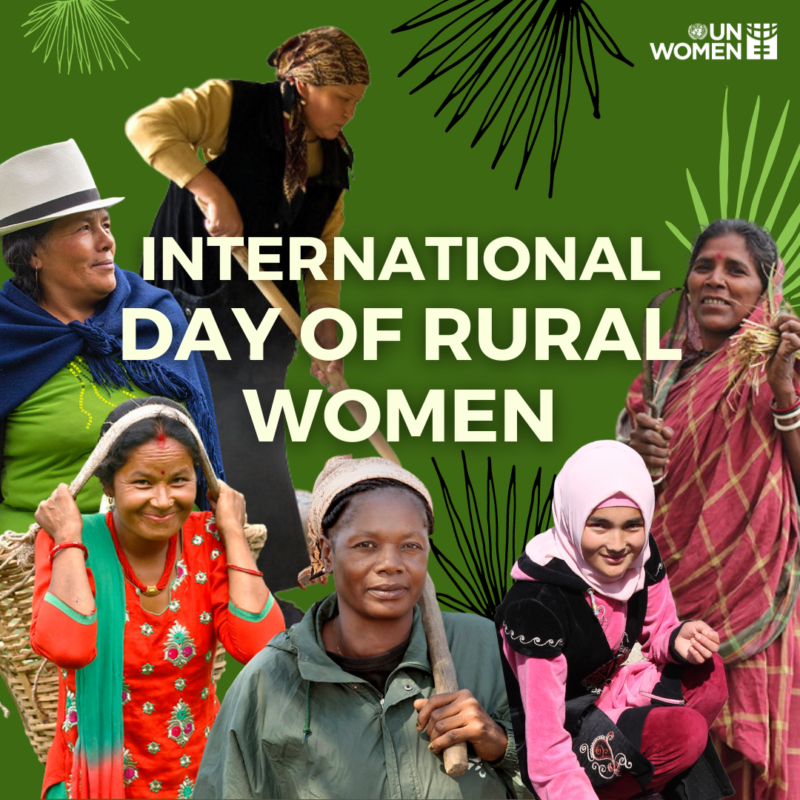Women play an indispensable role in sustaining the rural ecosystem of any country as entrepreneurs, wage earners and by farming. India has around 15 million women-owned enterprises, representing 20% of all enterprises. However, women face various challenges in building and scaling their businesses, which are further aggravated by the global economic and health crises, socio-cultural divide, gender biases and digital divide.
The International Day of Rural Women (October 15) was established by the UN General Assembly on 18 December 2007, recognizing “the critical role and contribution of rural women, including indigenous women, in enhancing agricultural and rural development, improving food security and eradicating rural poverty.”

With less than 10 years to achieve the Sustainable Development Goals, including Zero Hunger (Goal 2) and Gender Equality (Goal 5), organizations need to support rural women and girls around the world, to build their resilience, skills and leadership. At NuSocia, we strive to put ourselves at the centre of research and evidence-based programs to drive change. Based on our learnings and interactions with experts, we have identified the challenges faced by rural women entrepreneurs and ways to overcome them.
What challenges do rural women entrepreneurs in India face?
Women entrepreneurs face various challenges across their entrepreneurial lifecycle from start-up to growth. These challenges can be loosely grouped into three categories –
- Cultural stereotyping – This is driven majorly by cultural expectations around domestic responsibilities, perceptions that women are risk-averse and less ambitious and various biases based on socioeconomic factors.
- Resource constraints – Access to capital is a crucial factor in ensuring a business’s continued growth and success. However, limited access to resources leads to a vicious cycle with women often starting businesses with fewer assets and initial loans. In turn, future loans are more likely to be denied to them based on a lack of initial growth, which then stunts future growth opportunities.
- Lack of access to formal networks – Women entrepreneurs typically lack access to formal networks of investors, mentors, suppliers and customers.
How can organizations strengthen the ecosystem?
Listen to the voice of women entrepreneurs:The basis of any sustainable change is to first listen to the beneficiary group. Syndicated research on socio-economic challenges faced by women can help build the base for sustainable solutioning.
NuSocia is currently supporting a state government on a research study aimed at building a policy framework to nurture the women entrepreneurship ecosystem.
Empower women to dream: This can be done by promoting education and training for women, providing information to those wanting to start and grow a business and ensuring availability of affordable childcare support system to enable women to focus on enterprise building. At NuSocia, through our various engagements and interactions with sectoral experts, we understand that confidence-building among girls and young women is critical for their success in the future. CSR can play a significant role in building these skills in women, helping them to think critically, make decisions and solve problems.
Enable access to resources: While the participation of women in the entrepreneurship landscape is improving to some degree in urban centres, it is well established that there is a broader acceptance of men over women when reaching out for financial, technological or social support from family, friends and other stakeholders. One of the experts we spoke to aptly stated “The aim of a support system shouldn’t be to train women entrepreneurs as their male counterparts. Instead, it should shape an effective and equal system.”
- Finance – Funders, lenders and other financial institutions need to offer flexible financial instruments, tailored to the needs of rural women entrepreneurs.
- Process – Organizations should review their processes to identify and address sources of potential bias and exclusion that affect women entrepreneurs, in their supply chain.
- Networks – Incubators, accelerators and other business support groups can help women access formal networks and mentorship to build their business and navigate risk and growth. Organisations can promote these incubators as part of their CSR programs.
Change the View on Female Entrepreneurship: It would be nice, yet naive, to think that some of the challenges related to rural women entrepreneurs are specific to developing countries and thereto also, remote rural areas only.
Fortune magazine reported that a paltry 2.2% of venture capital went to female-led start-ups between 2016 and 2017. That percentage didn’t change an iota in 2018. The reason? Women are still seen as a liability because they might want to procreate or have a family life. To bring a change, leading organisations need to speak about it, support women entrepreneurship focussed accelerators as well as promote intrapreneurship opportunities for their own female workforce. This can also be done by forging and nurturing global partnerships.
Conclusion
When women entrepreneurs succeed, we all stand to benefit. Thus, it is vital for all stakeholders to pay close attention, empathize and align the ecosystem to help them flourish.
At NuSocia, we engage with several programs focussing on women empowerment and transformation of the women entrepreneurship landscape in India. We recently collaborated with Dhriiti, GIZ and NASSCOM Foundation as part of the Script4Her Impact Week, where we talked to experts on futuristic and gender-responsive solutions for rural women entrepreneurs in India. Click below to see how you too can drive gender-sensitive and transformational outcomes!
If you are interested in exploring potential collaborations to promote rural women entrepreneurs, reach out to us at [email protected]




